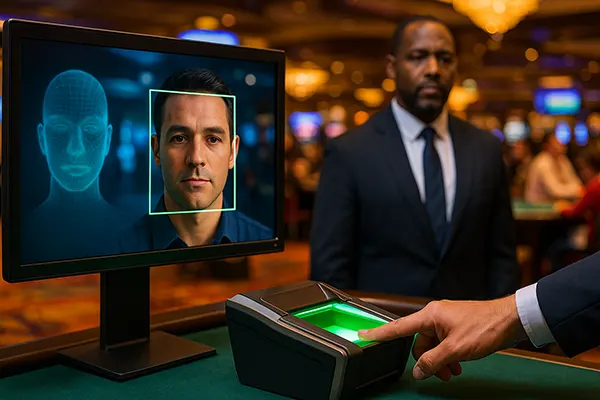
Biometrics in Casino Security: Current Practices in 2025
Biometric technologies have become a cornerstone of modern security across finance, healthcare, and now the gambling industry. In 2025, casinos are actively adopting advanced biometric systems to ensure player safety, prevent fraud, and comply with strict regulations. These methods are not just about convenience but also about maintaining trust and legal compliance in an increasingly digitalised environment.
Biometric Identification of Players
Casinos are implementing a wide range of biometric systems to verify the identity of their customers. Fingerprint recognition remains one of the most common methods, providing fast and reliable authentication both at entrances and gaming tables. Facial recognition, powered by AI, has gained momentum due to its non-invasive nature and the ability to function in real time, even in crowded spaces.
More advanced establishments have introduced iris and retina scanning, which are considered among the most accurate biometric identifiers. These systems are less prone to falsification and can be integrated into VIP access control or high-stakes gaming areas. In addition, voice recognition is being tested in customer service settings, allowing players to access personalised accounts securely through spoken commands.
These technologies reduce the risk of identity theft, underage gambling, and self-exclusion breaches. By ensuring that each player is correctly identified, casinos strengthen both operational integrity and customer trust.
Detection of Suspicious Behaviour
Beyond identification, biometrics are used to recognise behavioural patterns that may indicate fraud or problem gambling. AI-driven facial recognition software can analyse micro-expressions, body language, and unusual behaviour that may suggest collusion or cheating. Such systems are already operational in large venues across Europe, Asia, and North America.
Anti-fraud monitoring combines biometric data with transactional information to create a full risk profile of each player. For instance, sudden changes in betting patterns, combined with physical signs of stress detected by facial analysis, can trigger alerts for security teams. This approach helps casinos prevent both internal and external fraud attempts.
Moreover, biometric surveillance assists in identifying previously banned individuals, whether due to criminal activity or voluntary self-exclusion. This strengthens responsible gambling initiatives while protecting casino operations from legal risks.
Advantages and Risks of Biometric Security
The introduction of biometric technologies offers multiple advantages. Firstly, it speeds up customer verification, making entry and account management more efficient. Secondly, it provides a higher level of security compared to traditional passwords or ID cards, which can be lost or stolen. Thirdly, it enhances regulatory compliance by offering precise data about who is accessing gambling services.
However, the risks cannot be ignored. The storage of biometric data raises significant concerns about privacy and the potential for hacking. Data breaches involving biometric identifiers are particularly dangerous, as fingerprints or iris patterns cannot be changed like a password. Additionally, there is the issue of false positives, which may inconvenience players and harm the reputation of casinos if not properly managed.
Transparency and strong cybersecurity measures are essential to balance these risks. In practice, casinos must invest not only in biometric tools but also in advanced encryption and secure data management frameworks.
Privacy and Ethical Concerns
Biometric use in casinos inevitably raises questions about personal freedom and the ethical limits of surveillance. Players may worry about constant monitoring or about their data being shared with third parties. To address this, casinos are adopting strict policies on data minimisation, ensuring that only essential information is collected and retained.
Ethical guidelines are being shaped in cooperation with regulators, requiring casinos to inform customers clearly about how their data will be used. Many operators now provide opt-in models for biometric features, giving players the choice between traditional verification and biometric solutions.
Educating customers about the benefits and limitations of biometrics has proven to improve acceptance rates. When players understand that such measures are aimed at protecting both their funds and personal safety, resistance tends to decrease.

Legal and Regulatory Framework
In 2025, European and international regulations place strict obligations on casinos using biometric technologies. Under the General Data Protection Regulation (GDPR), biometric data is classified as sensitive information, requiring explicit consent from the individual. This means casinos must implement transparent consent procedures and allow players to withdraw that consent at any time.
Licensing authorities in jurisdictions such as Malta, the United Kingdom, and Denmark have issued detailed guidelines for the collection, storage, and processing of biometric information. Non-compliance can result in heavy fines and the suspension of operating licences, making strict adherence a business necessity.
Outside Europe, similar regulatory frameworks are being adopted. For instance, several US states now require biometric data to be stored within the country and encrypted to the highest standards. In Asia, governments are integrating biometrics into anti-money laundering (AML) measures, requiring casinos to verify high-value transactions through biometric authentication.
Future Outlook
Looking ahead, the role of biometrics in casino security is expected to expand further. Multi-modal systems combining fingerprints, facial recognition, and behavioural biometrics will likely become standard, offering even greater accuracy and resilience against fraud. Integration with blockchain technology may provide additional protection by ensuring biometric data is stored in decentralised and tamper-proof systems.
As technology advances, regulatory scrutiny will also intensify. Operators that embrace transparency, data protection, and responsible gambling measures will gain a competitive edge, both in reputation and customer trust. Those failing to adapt may face not only financial penalties but also reputational damage that could be difficult to recover from.
Ultimately, biometrics represent both an opportunity and a responsibility. The way casinos manage these tools today will shape the trust of tomorrow’s players and the sustainability of the industry as a whole.




